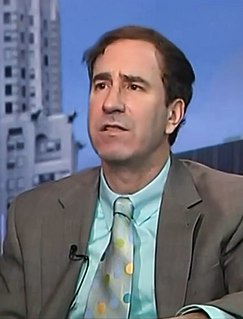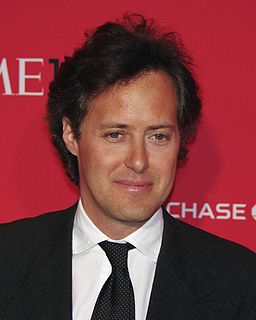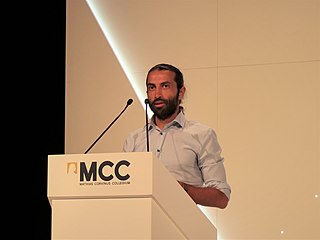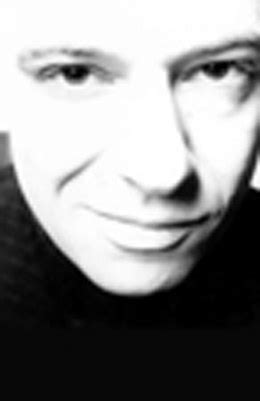Top 94 Desks Quotes & Sayings - Page 2
Explore popular Desks quotes.
Last updated on November 16, 2024.
God's word tells us that righteousness is a gift; it cannot be earned. But godliness is not a gift. We must pay a price to touch godliness through a daily decision to die to self and embrace the cross. God calls us to learn godliness in the classroom of life among people as we sit on airplanes and buses, walk among our neighbors and labor at our factories or desks.
I have a library room with four desks in it. On one of them is a spec, on one of them is a present work, on one of them is reading for a future work, on another desk is a novel I'm not doing until I'm a hundred and fifty, and things like that. But, contractually speaking, you just do one at a time when it's on and paid and live. You do your real day on one project and the rest is just literary life. Or intrusions.
We have a very open culture at the company, where we foster a lot of interaction between not just me and people but between everyone else. It's an open floor plan. People have these desks where no one really has an office. I mean, I have a room where I meet with people. But it has all glass, so everyone can see into it and see what's going on.
I have ... spoken to the heads of various Wall Street equity derivatives trading desks and every single one of the senior managers I spoke with told me that Bernie Madoff was a fraud. Of course no one wants to take an undue career risk by sticking their head up ... The fewer people who know who wrote this report the better. I am worried about the personal safety of myself and my family.
As a kid, I used to come to our offices and play under the desks of people I now work with, or who work for me. I would come in and play with fabrics and make little clothes for my Snoopy. People here feel like family. But if I couldn't make a difference, I wouldn't be here. My father wouldn't want me to be here.
The late '60s and the '70s, a lot of this really beautiful equipment was being made and installed into studios around the world and the Neve boards were considered like the Cadillacs of recording consoles. They're these really big, behemoth-looking recording desks; they kind of look like they're from the Enterprise in Star Trek or something like that. They're like a grayish color, sort of like an old Army tank with lots of knobs, and to any studio geek or gear enthusiast it's like the coolest toy in the world.
Mma Ramotswe had a detective agency in Africa, at the foot of Kgale Hill. These were its assets: a tiny white van, two desks, two chairs, a telephone, and an old typewriter. Then there was a teapot, in which Mma Ramotswe – the only lady private detective in Botswana – brewed redbush tea. And three mugs – one for herself, one for her secretary, and one for the client. What else does a detective agency really need? Detective agencies rely on human intuition and intelligence, both of which Mma Ramotswe had in abundance. No inventory would ever include those, of course.
Palestinians no longer blamed Yasser Arafat or Hamas for their troubles. Now they blamed the Israelis for killing their children. But I still couldn't escape a fundamental question: Why were those children out there in the first place? Where were the parents? Why didn't their mothers and fathers keep them inside? Those children should have been sitting at their desks in school, not running in the streets throwing stones at armed soldiers.
This is often the way it is in physics - our mistake is not that we take our theories too seriously, but that we do not take them seriously enough. It is always hard to realize that these numbers and equations we play with at our desks have something to do with the real world. Even worse, there often seems to be a general agreement that certain phenomena are just not fit subjects for respectable theoretical and experimental effort.
The weight of the old world is stifling, and trying to shovel its weight off your life is tiring just to think about. The constant shuttling of opinions is tiring, and the shuffling of papers across desks, the chopping of logic and the trimming of attitudes. There must, somewhere, be a simpler, more violent world.
Don't equate activity with efficiency. You are paying your key people to see the big picture. Don't let them get bogged down in a lot of meaningless meetings and paper shuffling. Announce a Friday afternoon off once in a while. Cancel a Monday morning meeting or two. Tell the cast of characters you'd like them to spend the amount of time normally spent preparing for attending the meeting at their desks, simply thinking about an original idea.
I want to stay active. I want to find that mind-body connection every single day, and I want other people to have that because we spend our lives on our phones, at our desks. We're not thinking about our bodies and the mental connections we should be having, and those moments help us push through to live our best life.
These are the men who, without virtue, labour, or hazard, are growing rich, as their country is impoverished; they rejoice, when obstinacy or ambition adds another year to slaughter and devastation; and laugh, from their desks, at bravery and science, while they are adding figure to figure, and cipher to cipher, hoping for a new contract from a new armament, and computing the profits of a siege or tempest.
At its heart, this book touches on a mystery of economics: what exactly is happening in our world, and why does it often work so well? As the authors show, apparently messy systems - such as untidy desks - actually exhibit a high degree of order: the piles of paper are close to hand, and the most important documents tend to make their way to the top while un-needed ones sink to the bottom. If the mess works, why mess with it?
It is a shallow criticism that would define poetry as confined to literary productions in rhyme and meter rhythm. The written poem is only poetry talking, and the statue, the picture, and the musical composition are poetry acting. Milton and Goethe, at their desks, were not more truly poets than Phidias with his chisel, Raphael at his easel, or deaf Beethoven bending over his piano, inventing and producing strains, which he himself could never hope to hear.
And it really doesn't matter if we're under our desks with our hands over our heads or not, does it? No, said Mrs. Baker. It doesn't really matter. So, why are we practicing? She thought for a minute. Because it gives comfort, she said. People like to think that if they're prepared then nothing bad can really happen. And perhaps we practice because we feel as if there's nothing else we can do because sometimes it feels as if life is governed by the slings and arrows of outrageous fortune.
If there is no solace in the fruits of our research, there is at least some consolation in the research itself. Men and women are not content to comfort themselves with tales of gods and giants, or to confine their thoughts to the daily affairs of life; they also build telescopes and satellites and accelerators and sit at their desks for endless hours working out the meaning of the data they gather.
Television, radio, social media. The 24/7 news cycle plows forward mercilessly on our desks, in our cars and in our pockets. Thousands and thousands of messages and voices bombard us from the moment we wake, fighting for our attention. All we see and hear, all day long, is news. And most of it is bad.
After it's all over, the early childhood, a chain of birthdays woven with candlelight, piles of presents, voices of relatives singing and praising your promise and future, after the years of schooling, fitting yourself into different size desks, memorizing, reciting, reporting, and performing for jury after jury of teachers, counselors, and administrators, you still feel inadequate, alone, vulnerable, and naked in a world that can be unforgiving and terribly demanding.
Starbucks was founded around the experience and the environment of their stores. Starbucks was about a space with comfortable chairs, lots of power outlets, tables and desks at which we could work and the option to spend as much time in their stores as we wanted without any pressure to buy. The coffee was incidental.
At the time, liberals didn't understand that they had First Amendment rights. So, I was doing cartoons in this narrative cartoon form about subject surrounding that and as I was turned down by editor after editor at each publishing house, I began to notice on their desks this new newspaper called The Village Voice, which I then went and picked up and thought, well my god, these editors that were turning me down all, whom tell me how much they like my stuff, but they don't know how to market it because nobody knows who I am. If I got into this paper, they would know who I am.
While on the subject of burning books, I want to congratulate librarians, not famous for their physical strength, who, all over this country, have staunchly resisted anti-democratic bullies who have tried to remove certain books from their shelves, and destroyed records rather than have to reveal to thought police the names of persons who have checked out those titles. So the America I loved still exists, if not in the White House, the Supreme Court, the Senate, the House of Representatives, or the media. The America I loved still exists at the front desks of our public libraries.
Working from home meant we could vary snack and coffee breaks, change our desks or view, goof off, drink on the job, even spend the day in pajamas, and often meet to gossip or share ideas. On the other hand, we bossed ourselves around, set impossible goals, and demanded longer hours than office jobs usually entail. It was the ultimate "flextime," in that it depended on how flexible we felt each day, given deadlines, distractions, and workaholic crescendos.
Most people would say they live with an internal angst that they can't always put their finger on. This is because the Internet has changed our very way of being in this world, compelling us to be perpetually "on" - from our cars to our computers, our tablets to our smartphones, our desks to our living rooms or dining tables, our churches to our libraries to our schools.
Our life is made up of time; our days are measured in hours, our pay measured by those hours, our knowledge is measured by years. We grab a few quick minutes in our busy day to have a coffee break. We rush back to our desks, we watch the clock, we live by appointments. And yet your time eventually runs out and you wonder in your heart of hearts if those seconds, minutes, hours, days, weeks, months, years and decades were being spent the best way they possibly could. In other words, if you could change anything, would you?
Doo-wop is the true music to me, man. Doo-wop was what nurtured me and grew me into who I am, and I guess even when I was in school, the teacher probably thought I had ADD or something every day, because I'd be beating on the desks, singing like the Flamingos or the Spaniels or Clyde McPhatter or somebody.
This famous quote hangs over my desk, as well as the desks of many people with the hubris and optimism to believe they can change the world for the better. It seems implausible, yet time and again history has proven it true. Virtually every major shift in cultural history can trace its origins to the work of a small group, often gathered around an innovative thinker or body of thought.
It is a great mistake for presidents and other leading executives of organizations having branches throughout the country to chain themselves to their desks at headquarters and send out rigid instructions to those in charge of distant branches and offices. Because a man sits in a palatial office in New York or Chicago or Philadelphia or Detroit and draws a big salary, it does not necessarily follow that he knows better than the man on the spot what ought to be done.... Paul, Caesar, Napoleon did not merely sit at home and issue long-range instructions.
Flying has always been to me this wonderful metaphor. In order to fly you have to trust what you can't see. Up on the mountain ridges where very few people have been I have thought back to what every flyer knows. That there is this special world in which we dwell that's not marked by boundaries, it's not a map. We're not hedged about with walls and desks. So often in an office the very worst thing that can happen is you could drop your pencil. Out there's a reminder that are a lot worse things, and a lot greater rewards.
When Colin Powell showed up as Secretary of State in 2001, most State Department employees still didn't even have computers on their desks. When I got there they were not mostly permitted to have handheld devices. I mean, so you're thinking how do we operate in this new environment dominated by technology, globalizing forces? We have to change, and I can't expect people to change if I don't try to model it and lead it.
Cultural wisdom says 'Don't quit your day job.' Yet I think these desires represent our psyche's stretch toward wholeness. And to be whole, as many religious tranditions teach, is to make manifest a unique face of God in the world. We don't want to be irresponsible, yet for every accountant who deserts his family and sails for Tahiti, ten American men have heart attacks at their desks, after hours.
































